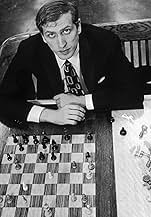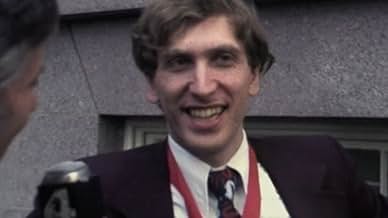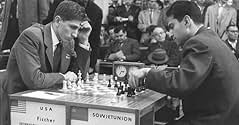'Bobby Fischer Against the World' is a documentary feature exploring the tragic and bizarre life of the late chess master Bobby Fischer. The drama of Bobby Fischer's career was undeniable, f... Read all'Bobby Fischer Against the World' is a documentary feature exploring the tragic and bizarre life of the late chess master Bobby Fischer. The drama of Bobby Fischer's career was undeniable, from his troubled childhood, to his rock star status as World Champion and Cold War icon, t... Read all'Bobby Fischer Against the World' is a documentary feature exploring the tragic and bizarre life of the late chess master Bobby Fischer. The drama of Bobby Fischer's career was undeniable, from his troubled childhood, to his rock star status as World Champion and Cold War icon, to his life as a fugitive on the run. This film explores one of the most infamous and myste... Read all
- Nominated for 1 Primetime Emmy
- 1 win & 5 nominations total
- Self
- (archive footage)
- Self
- (as Dr. Anthony Saidy)
- Self
- (archive footage)
- Self
- (archive footage)
- Self
- (archive footage)
- Self
- (as Fernand Gobet PhD)
Featured reviews
Chess made him and destroyed him
The key historical event that the film revolves around is the 1972 World Championship against the Soviet grandmaster Boris Spassky. This dramatic confrontation hosted in Iceland had huge political significance seeing as it set the American against a Russian at the height of the cold war. As a result it was probably the most internationally famous chess match ever played. Even at this early stage, however, Fischer's erratic behaviour is quite evident. He almost never made it in the first place due to his own personal demons, when finally there he arrived absurdly late and then proceeded to complain about the hum of the TV cameras. You might find yourself wishing that the dignified Spassky actually defeated this highly strung man. But this is partially why this documentary is an interesting one, as its central character is not particularly likable at all. There is very little actual footage of Fischer; he remains a very enigmatic figure. After the Spassky match less and less is seen of him, so much so that his next public appearance in a match in Yugoslavia occurs the best part of twenty years later. In agreeing to this he contravenes international law, seeing as this country was in the midst of a terrible war. The sight of Fischer publicly spitting on the letter warning him that he would be breaking international law is a grim one indeed; the years that followed until his death in 2008 seem to be equally mysterious and sad.
Bobby Fischer Against the World is a very good documentary about a troubled man who was destroyed by the only thing he loved. The documentary states that he was the greatest player there ever was. Personally I think this is a somewhat romantic statement based mostly on the drama of his ascent. But for sure, he was one of the most fascinating chess players that ever lived and in many respects remains an enigma still.
A Good Documentary for the Universal Audience
Chess has survived for thousands of years and is arguably the hardest game in the world. Through the eons, if there is one name or one master that has towered above anyone else, it is the American Bobby Fischer. When Fischer defeated Boris Spassky in 1972, the match created more publicity than any other chess event in history (even more than when IBM's computer Deep Blue defeated Garry Kasparov in 1996). A lone American had defeated the mighty Soviet chess machine during the cold war. What should have been just the beginning of an already great career for Fischer, it was actually just the end.
Bobby Fischer made one of the great disappearances of any famous person of the 20th century. He did not die, but was as elusive as Bigfoot after he won the world championship. For those who encountered him only would end of becoming frustrated because they realized he was slowly going insane. 20 years after winning the Championship (1992), Fischer reappeared to play Spassky for another match. When he appeared, it became even more obvious that the man had lost his mind. When the September 11th attacks happened, Fischer shocked the world when he applauded the acts on a radio program. He never played again and passed away in 2008.
This HBO program is fantastic in that it is presented in a manner that is suitable for those who barely know anything about chess or those who know the intricate details of Fischer's career and life. It keeps the viewers' attention by playing nice music in the background throughout. The program shows numerous photographs and television footage that most people have never seen. The central focus of the program is the Fischer - Spassky match of 1972, but it juxtaposes all kind of other topics such as Fischer's family and love life, and his affiliation with a cult group. The program even has Henry Kissinger talking about the match. Kissinger had encouraged Fischer to follow through with the match when Fischer was about to not show up. But, the program does not blame Fischer's religious obsession with chess for this mental breakdown. It posits that it could have been a possibility.
I will have to strongly disagree with one part of this documentary. It stated that when after Fischer won the world championship, he was arguably the most famous man in the world (aside from Jesus). I find this really hard to believe. One because Fischer was a merely just a chess champion and (2) there were many other gigantic figures at that time; Muhammad Ali, Richard Nixon, Chairman Mao, just to name a few.
In the end, the enigma will always remain the enigma. Nobody really knows why Fischer quit playing after 1972 or what caused his mental disintegration. Even though he forfeited his title to Karpov in 1975, why did he completely give up playing even tournaments and simuls altogether? What we are left is speculation. Many chess lovers will proudly proclaim that Fischer was the best player of all time. There maybe some truth to this, but I believe Garry Kasparov finally deserves this title. This is because Kasparov was willing to take on all comers, human beings or computers. Kasparov did this for almost 3 decades. Kasparov defeated an ongoing Champion Anatoly Karpov (one of the top 5 players ever) 5 times and he continued to defend this title beating brilliant and talented young players - Ivanchuck, Shirov, Topalov, Anand, Short, Leko, Kramnik, Kamsky, and so many others for another 2 decades.
*Please do not comment if you are going to get into a "greatest ever" debate - it will be yet another endless discussion and will lead to nowhere.* Fishcer's story is one of the great tragedies of chess, but in the short time that he was brilliant, he shined so brightly that it continues to illuminate to this day. Although his life ended to a sad decline, keep in mind, we remember and admire him for what he produced.
Great memories
Sins of Omission
Bobby cut his teeth, as it were, at the home of the Collins's, spending an inordinate amount of spare time with them as a young child. In their home, he learned from Jack -- a New York State Champion, an editor of "Modern Chess Openings," (America's leading précis on opening play), a respected Correspondence Chess player, and the dean of American Chess Teachers -- and he received needed motherly sustenance from Jack's sister Ethel.
The Rev. William Lombardy was Fischer's "second" in Reykjavik. It is he who fought the battles for Bobby with the administrators and the arbiters. By his doing so, Bobby could stay somewhat in the background getting his needed rest. The tension and responsibilities lay on the broad shoulders of the Rev. Lombardy, who did a magnificent job on the front lines acting for the Mercurial Mr. Fischer. The full story of Bobby Fischer cannot be adequately told without these three Fischer companions making some contribution to his film life.
Given these three omissions one has the right to ask why Susan Polgar is represented as a Fischer expert. She was but three years old when the Fischer-Spassky match was played, and though she may have had later social connection with him, it is wrong to present her in the role she plays.
One can wonder too how Sam Sloan was chosen to give his views of Fischer. His knowledge of Fischer is a distant one at best.
Plaudits, though, are due for the in-depth interviews of Larry Evans and Tony Saidy, two who knew Bobby well. The same may be said of Asa Hofmann, to this day a legend in New York chess circles.
Be careful what you wish for . . .
Garbus's formula is a standard one but succeeds brilliantly here. She juxtaposes archival footage and still photos (much of which, I believe, has never been shown publicly before) with contemporary interviews of many of the key players from Fischer's two-decade pursuit of the title. These individuals - fellow chess players (several of whom were his boyhood friends), tournament organizers, journalists, even his bodyguard - were all members of the small cadre of people that Bobby allowed into his life. Many were even part of his inner circle at Reykjavik. To a person, then, the interviewees were uniquely qualified to share their recollections of Bobby. But, beyond that, they had been positioned to gain some understanding of Bobby. In this film, they share that understanding, or at least their attempts at understanding, of who Bobby Fischer was, and more importantly, why he was that way.
One can only try to imagine the monumental effort required by Garbus to convince them to appear on camera. That she was even able to get Henry Kissinger (now a heavyweight in more ways than one) speaks volumes about her credibility. Kissinger's presence in the film is only one reminder of what was at stake in Reykjavik. Garbus reminds us that this was war: US versus the USSR, capitalism versus communism, freedom versus oppression, each could have been used to describe the battle. But in the end, the only one that really mattered was the title Garbus chose for her work: Bobby Fischer against the World.
Garbus filmed most of the interviews against stunning backdrops of wood-paneled libraries and polished marble floors. In that way she provides quite a contrast for some of the interviewees with their rumpled, 'haven't shaved in three days' look. By doing so, she heightens their humanity, and their humility. Bobby, by contrast, throughout the film, in his words and by his actions, only serves to confirm that he may not have had much of either.
Chess grandmasters Larry Evans and Anthony Saidy, who both knew Bobby since he was a little boy, are not just particularly articulate and insightful, but are also fonts of interesting 'Bobby facts'. Saidy tells us that when Bobby decided to camp out at Saidy's parents' home to avoid the press in the weeks leading up to the World Championship, Saidy's father was dying of cancer. "Bobby, about you staying with us, my dad is sick with cancer". "It's okay, I don't mind", replied the only slightly self absorbed Fischer.
Many of the interviews are with Europeans - Icelanders, Russians, Germans - and all reinforce how impressive it is to hear someone speak fluently in a language other than their native tongue. One has no doubts that their memories and minds must also be sharp. In this context, it is perhaps ironic that LIFE photographer and Scotsman Harry Benson's humanizing photos of Bobby, shown prominently on screen while he speaks, need no words to tell us all we need to know.
Two segments are, each, extraordinary. Saemi Parsson who was Bobby's bodyguard in Reykjavik tells the camera how, after not hearing a word from Bobby in 22 years ("not a peep"), he received the imprisoned Bobby's frantic phone call from Japan (the Japanese had detained Fischer at the request of the US). That Bobby chose to call Parsson, is not quite the correct statement. Rather, that Bobby had no one to call but Parsson seems closer to the truth. We are reminded by this episode that Bobby, by then, was not only stateless, but had severed all relationships with his family and friends. He was alone in more ways than one. The other segment is priceless and is comprised of a faded ABC Wide World of Sports TV special featuring noted sports artist LeRoy Neiman. Neiman, who expected to be "bored to pieces" by the match in Reykjavik draws Fischer as a matador skewering the hapless Spassky! But, can you imagine? ABC's Wide World of Sports? For chess? Such was the impact of Robert James Fischer.
Immediately after beating Spassky, Fischer began his life of seclusion. It may have been even sadder that he also effectively stopped playing chess at the same time, at age 29. All of us are familiar with Fischer's increasingly bizarre post-Reykjavik antics. Sometimes attributed to eccentricity, Garbus makes no secret that she believes Bobby's behaviour was a product of mental illness. Through the images and words of her film, she leaves no other way to label Bobby's paranoia and psychotic pronouncements. She puts the proof right there, in the flickering of a projector, for all to see. We wish it weren't so.
Did you know
- TriviaThough Bobby Fischer hated Soviet players for what he considered collusion i.e. drawing matches between themselves so they could concentrate on beating non-Soviet players like Fischer, Bobby Fischer liked and respected Boris Spassky. In turn, Spassky returned the affection and esteem.
- Quotes
Larry Evans - Former Champion: Reportedly, Fischer's last words were: "Nothing is so healing as the human touch".
- ConnectionsFeatured in Ebert Presents: At the Movies: Episode #1.20 (2011)
- SoundtracksTheme from Shaft
Words and Music by Isaac Hayes
Published by Irving Music, Inc. (BMI)
Performed by Isaac Hayes
Courtesy of Stax Records
By arrangement with Concord Music Group, Inc.
- How long is Bobby Fischer Against the World?Powered by Alexa
Details
- Release date
- Countries of origin
- Official sites
- Languages
- Also known as
- Bobby Fischer: Genius and Madman
- Filming locations
- Production companies
- See more company credits at IMDbPro
Box office
- Gross worldwide
- $90,511
- Runtime
- 1h 33m(93 min)
- Color
- Aspect ratio
- 1.78 : 1






























